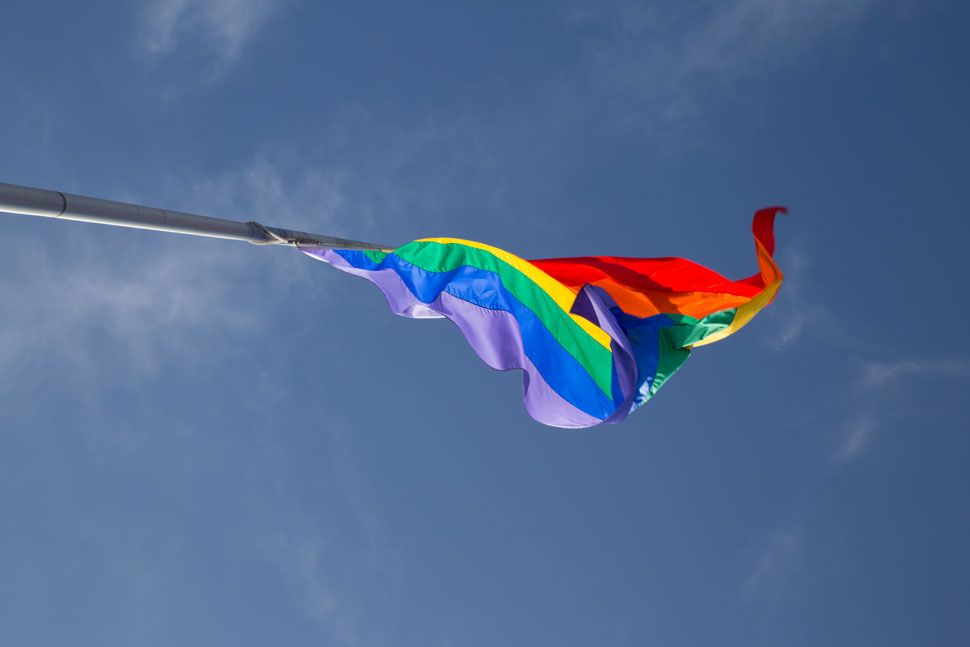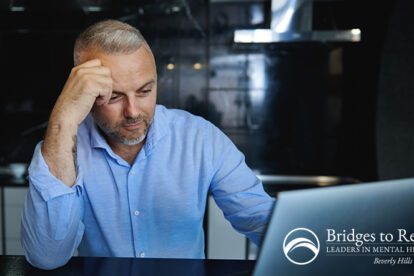The Impact of Personal and Political Discrimination on LTBTQ Mental Health

Pride Month provided ample opportunities for celebration, but also reminded us of the struggles still faced by the LGBTQ community. One of the most critical areas of concern is the state of LGBTQ mental health, which is deeply shaped by both personal discrimination and political prejudice and hampered by unique barriers to treatment. If you are struggling with a mental health disorder, connecting with culturally relevant treatment can open up the door to true healing in a safe, supportive environment in which your sexual orientation and gender identity are honored.
Last month, members of the LGBTQ community and allies came together in cities across the United States to celebrate Pride Month through parties, community events, and media coverage. And this year there was much to celebrate; it was the first Pride Month during which same-sex marriage is legal in every state, a milestone in the fight for LGBTQ rights and one that has been a long time coming. Meanwhile, conversations both big and small are happening across the world that reflect growing awareness and inclusivity, from the creation of UN’s first LGBTQ human rights watchdog to Target providing gender-neutral bathrooms, from Caitlyn Jenner appearing on the cover of Sports Illustrated to Justin Trudeau becoming the first Canadian prime minister to march in the Pride Parade. In fact, the list of firsts is extensive, representing great gains in both public life and private rights.
But June also brought one of the most horrific attacks on LGBTQ people in history, killing 49 and wounding 53 at Pulse, a gay nightclub in Orlando. The shooting was a stark reminder of the marginalized space the LGBTQ community still largely occupies and, for many, an extension of the hatred and violence – both actual and threatened – they face every day. In the midst of celebration of the gains made by the LGBTQ community, it is vital that we reflect on the barriers that still exist to equality, acceptance, and safety, and the impact trauma, homophobia, biphobia, and transphobia so often have on LGBTQ mental health.
Begin Your Recovery Journey.
877-727-4343The State of LGBTQ Mental Health
Few are surprised to learn that members of the LGBTQ community suffer from poorer mental health than their gender-conforming, heterosexual counterparts. Many, however, are unaware of just how great the disparity is. Research shows that:
- Gay men are six times as likely to suffer from depression as straight men.
- Almost 50% of transgender people experience symptoms of depression and anxiety.
- Bisexual women are twice as likely to have an eating disorder than heterosexual women.
- Lesbians who are not out are 2-2.5 times more likely to experience suicidal ideation than straight women.
- 6% of gay men have attempted suicide, compared to <1% of the general population.
- LGBTQ youth are four times more likely to attempt suicide than their straight peers.
- 41% of transgender people have attempted suicide.
As Celine Gounder points out in The Guardian:
[A] person’s membership in a highly stigmatized minority exposes them over time to disproportionately higher levels of stress related to prejudice, harassment, discrimination, rejection, hostility, sexual assault, and hate crimes. That stress leads to worse mental health, and, in turn, worse physical health.
In other words, the disproportionately high rates of psychological distress are directly attributable to discrimination that manifests in multiple arenas and diminishes the ability to maintain emotional and behavioral well-being. Whether coming in the form of a hate crime, parental rejection, professional discrimination, or harassment by peers, prejudice matters, and can leave a lasting mark on psychiatric health at any age.
The Devastation of Personal Discrimination
M.C. Lampe knows the pain of discrimination all too intimately, and bears the scars of it on the skin. Growing up in Louisville in a Southern Baptist community, Lampe’s attraction to girls and refusal to identify with gendered pronouns made Lampe a prime target for harassment. After two teachers staged an intervention to put an end to Lampe’s first romance, Lampe began wearing heavy makeup as a kind of hyper-feminine camouflage, hoping to escape scrutiny and pass as gender-conforming. But it didn’t work; the harassment was constant and it was unbearable.
Lampe couldn’t take any more bullying. Not one more homophobic taunt. Not one more classmate refusing to sit at a nearby desk or change clothes within view at gym. So the devastated 9th grader brought a knife to school and vowed, ‘If someone else says something, I’m done.’ Someone did say something – and Lampe went to the high school bathroom and slit both wrists.
Panicked, Lampe told a teacher immediately and was swiftly sent to an inpatient facility for mental health treatment, followed by outpatient therapy that “fostered a new commitment to staying alive.” The road to recovery itself was deeply rooted not just in high-quality psychiatric care, but in accepting Lampe’s gender and sexual identities and forging a sense of community with other LGBTQ people to fight against the pain of discrimination and create a shield against social violence.
The Impact of Political Discrimination
Lampe’s story is devastating, inspirational, and a stark illustration of the power personal experiences of discrimination can have to psychological health. However, members of the LGBTQ community are increasingly drawing connections between political discrimination and LGBTQ mental health. Neal Broverman writes for The Advocate:
When anti-LGBT legislation is advanced or passed – as it has recently in places like Georgia and Kentucky – it’s rare to hear a counterargument based on the ramifications for LGBT well-being. ‘Bathrooom bills’ that force gender-noncomforming people to use restrooms that conflict with their identity can physically endanger trans people, but what effect do they have on their self-esteem? How will a queer teen interpret their state senator pushing for businesses to be allowed to discriminate against him? Government-sanctioned intolerance has its far-reaching implications.
Not only does political discrimination provide practical barriers to equality, dignity, and safety that can have profound psychological effects, it also bolsters personal discrimination by creating an environment in which prejudice is not an individual matter, but enshrined in legislation and culture. An individual can treat you like a second-class citizen in spirit, but policy can make you a second-class citizen in fact. And that has serious consequences for how LGBTQ people view themselves, the safety they feel, and the opportunities they have, even if their immediate daily environment is supportive.
Call for a Free Confidential Assessment.
877-727-4343Barriers to Treatment
There is no doubt that both personal and political discrimination cause serious damage to mental health within the LGBTQ community. Unfortunately, the institutions traditionally charged with helping people heal from emotional and behavioral distress have historically been a hostile place for LGBTQ people. From overt pathologization of homosexuality itself to ignorance of the unique factors impacting LGBTQ mental health, mainstream psychiatric health services have often provided inadequate or even damaging care. Gounder writes:
As of now, too many doctors are unfamiliar with the distinct issues affecting the LGBTQ population. It’s a group less likely to have regular access to care, or to care that addresses crucial issues. Physicians need to develop greater familiarity with LGBT bodies in a way that affirms and encourages its members to seek medical care. While sexual minorities are gaining wider acceptance, rights on paper won’t eliminate health and other social disparities. Healthcare providers must educate themselves about the medical needs, language and culture of these communities.
The emergence of LGBTQ mental health care services has begun to dismantle some of the barriers to psychiatric services by providing you with treatment delivered by clinicians with specific knowledge about the needs of the LGBTQ community. Unfortunately, these specialized services are not available in all communities, and are often limited in scope. If your mental health issues require more intensive treatment than outpatient services can provide, for example, finding treatment can become a complicated prospect.
Culturally Relevant Care
At Bridges to Recovery, we offer comprehensive mental health treatment for people struggling with mental health disorders within a safe, supportive residential environment. While we accept clients from all walks of life, we recognize that each person comes to us with a unique history that must be honored in order to provide the highest quality care. As part of our treatment planning and delivery, our experienced clinicians remain cognizant of the sociopolitical context in which your mental health issues emerge and manifest, and provide specialized therapies that allow you to explore the effects of both personal and political discrimination on your lived experiences. This includes individual psychodynamic therapy, trauma-focused therapies such as Somatic Experiencing and EMDR, and a variety of group and holistic therapies that give you new, innovative avenues toward recovery.
While the impact environmental stressors have is acknowledged in many of the therapeutic modalities offered at Bridges, the unique sociopolitical focus of Relational Therapy is often a particularly critical part of the healing process for LGBTQ people. Based on the understanding that interpersonal relationships and broader cultural contexts have a profound impact on the development of our psychological health, Relational Therapy gives you the opportunity to explore and contextualize your experiences within a social constructivist framework while gaining the skills to fortify emotional well-being and guide you toward healthier stress responses. This process can be instrumental in reframing how you understand and value yourself as well as helping you process experiences of discrimination and trauma.
We also recognize that the quality of clinical care is only part of the recovery process. In order to create truly transformative treatment experiences, we offer an intimate environment in which you are always made to feel welcomed and accepted. With a maximum of only six clients at a time, we are able to ensure that you receive the personalized attention within a warm therapeutic community. Here, you will not be judged or shamed, but accepted for who you are and treated with kindness, dignity, and respect.
Collective healing and true protection the health of the LGBTQ community as a whole requires widespread structural and cultural change. Individual treatment, however, can alleviate the pain that accompanies mental health disorder diagnoses and open up the path to greater self-knowledge, self-care, and stability. By working together, we can help you create a richer, more fulfilling life and rejuvenate your sense of joy, self-esteem, and possibility.
Bridges to Recovery offers comprehensive residential care for people living with mental health disorders as well as co-occurring substance abuse and eating disorder treatment. Contact us for more information about our innovative program and how we can help you or your loved one start the journey toward lasting wellness.
Lead Image Source: Flickr user Lukas Volk






